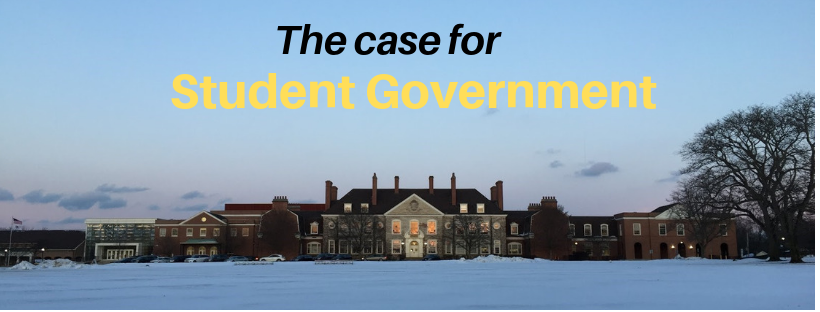Don’t Tread on Me: In Favor of Student Government
Photo and graphic created by Casey Murray.
Student Council plays an important role at LFHS. But students deserve more say in the decisions made here.
March 1, 2019

The students of Lake Forest High School need and deserve a proper Student Government. Such a government would tirelessly advocate for its constituents, promote student clubs and activities, provide services, and, most importantly, play an active role in governing the school.
Student Council, in its current format, already engages in some of these tasks. It runs pep rallies, charity drives, dances, and countless other activities. Since the beginning of the school year, it has become steadily more communicative about what it does. It also provides a useful forum for students to suggest improvements to the school.
These things are good — very good — and I believe that I speak for all LFHS students when I commend Student Council for its efforts. Our elected representatives in the form of our executive board and our class presidents are carrying out their duties admirably. They are upholding the social contract.
It is here, however, that we must consider another concept in the theory of government. It is a simple concept, only two words: popular sovereignty.
When the Founding Fathers wrote our Declaration of Independence, they grounded it in popular sovereignty. And 11 years later, when they began our Constitution with We the People, they enshrined the concept forever. Since that moment, the federal, state, and local governments of the United States have been predicated on popular sovereignty – the idea that all authority derives from the consent of the governed.
Contrast that with Student Council. Its authority undeniably comes from the school; the students had no part in drafting its bylaws and the school can always abolish it if it so chooses, even if that is an unlikely possibility. Of course the students on the council run its operations, but to pretend that its authority is therefore derived from the student body is an unfounded leap of reasoning. For this one reason, it can never be honestly called a student government, even if the school website implies the same.
This objection is mainly a petty point of philosophy; Student Council doesn’t really try to be a student government and shouldn’t be judged by those criteria. But would any American be content if their elected officials could be dismissed by Vladimir Putin, even if he never used that power? No, of course not.
The current situation, where Student Council can be abrogated out of hand by a group of people who are not students and could never hope to truly understand students, is similar, if at a vastly smaller scale. The house’s foundation has never wavered, but we know that it rests upon quicksand and we don’t like it.
As human beings, students deserve self-determination. To argue that our age disqualifies us from governing ourselves is a shaky assumption that could easily be extended to other demographic groups; hence, it is not a healthy thing in any self-respecting democracy. Considering that the Millennials and our generation will control the reins of power in a few short election cycles (and everything that entails), potential ageists would be well-advised to put the matches and fireworks away and go back to playing with their alphabet blocks.
There is truth in the statement that students are immature and not yet intellectually equipped to handle the demands of complete self-government. This is why we cannot vote, and this is why we do not ask to be given the authority to fire teachers, or ban homework on weekends, or replace the American flag on the flagpole with a Canadian one.
But that argument does not, can not, and must not extend to all areas. There are some fields where adults should have severely constrained influence. If we want to unilaterally replace the library chargers, for example, or buy tables for additional lunch seating in the Lower Commons, we should be able to. It’s not hurting anyone, and in doing so we are teaching ourselves how to govern while we improve the school for ourselves and for our posterity. Sounds like a win-win.
Some who read the above paragraph will object. They will worry that high schoolers are not serious enough to govern themselves. They will fear that LFHS might become a no man’s land where an eternal war rages and paper airplanes careen into walls, windows, teachers, students, and anything else that wanders within range. Oh, the horror!
But I would argue that the possibility of complete anarchy is exactly why we should be given sovereignty. It would be objectively fun to experience the complete disintegration and collapse of Student Government, and highly educational besides.
Of course, it is far more likely that a Student Government would be a force for good. We have a simply ludicrous number of passionate and committed students; many of them are serving on Student Council even now, but there are most certainly others. A powerful and sovereign Student Government would attract these leaders-in-waiting out of the woodwork, and along with the students already on Student Council they would be a hedge against anarchy.
The purpose of government is to tie people together. If there is no strong central government, there is no strong shared identity. Before the Constitution, we were New Yorkers and Virginians and South Carolinians. Now, we are all Americans.
A strong Student Government would do the same for Lake Forest High School. Imagine the shared identity and purpose we would feel if we held the reins. Instead of students at Lake Forest High School, focused on our many disparate activities, we would be the students of Lake Forest High School, focused on our shared experiment in self-government.
At the Talent Show last week, we came together to celebrate the talent of our best and brightest. Imagine if that solidarity were the norm and not the fleeting exception. That is school spirit, and it requires shared responsibility to take root and grow. You can’t make a fire with nothing but newspaper — you need sturdy logs and enduring embers. You can’t make school spirit by throwing posters everywhere and holding pep rallies and locking everybody in the same building from 8:15 to 3:20 — you need a dynamic institution that everybody has a stake in. You need a government of, by, and for the students.
That is what I mean when I say “Student Government.” I am not advocating for the overthrow or dismantling of Student Council — far from it. Any organization that gives students the ability to influence how the high school is run should be cherished and preserved, and that extends to Student Council.
I am advocating for dramatically empowering the students of this school and granting them tangible authority. I would even suggest that Student Government be given partial ownership of some school facilities. We could increase the affordability of senior parking. We could get rid of the flatscreen televisions in the cafeteria and use the cash for something useful. We could require clubs to take down outdated and irritating posters. We could regulate the prices of tickets to LFHS sporting events or propose amendments to the code of conduct that we live under. With such a direct influence on students’ daily lives, Student Government could not help but be something that everybody is involved in and proud of. If the pep rallies, football games, plays, talent shows, and so on are flashes of brilliant light, Student Government would be a never-ending bonfire, a cornucopia of school spirit and student solidarity.
This latest proposal will seem most radical of all. But since we are the people who actually attend the school, we are certainly the people who know how best to improve it. And we should not have to ask for improvements; we should be able to put them into effect ourselves. Remember the example of Vladimir Putin from earlier? Would anyone want to have to ask him to repair the roads? Of course not. We students are human beings with hearts to feel and minds to know and deserve the same sovereignty that voting-age Americans have – even if at a smaller scale.
Again, I firmly believe that Student Council ought to be preserved, not destroyed or broken up. It is a well-oiled executive branch and its leaders know what they are doing. I simply propose that we create separate legislative and judicial branches to complement the council. Perhaps we could center the judiciary on Student Government’s teacher advisers as yet another hedge against anarchy. Such a three-branch government would be more dynamic, interesting, and educational than what we have now; we could turn LFHS into a schoolwide civics class, with all the obvious benefits that entails.
I would now like to directly address everyone currently serving on Student Council – students and advisers alike. You have a chance to take a step forward into the unknown. You have a chance to make Lake Forest High School a city on the hill, a model that other students can look up to. You have a chance to immortalize your names as the ones who gave students not only a voice with which to speak, but also hands with which to build. So set out into the darkness, council members, and win for us the government we deserve.
The road ahead will be littered with turmoil; the same is true whenever full self-determination is granted. We will stumble from time to time, but if we strive for consensus in pursuit of the common cause, there is nothing that we, the students, cannot do. So parents, teachers, advisers, administrators, members of the Board, fellow Americans: grant us this small liberty, that we might learn how best to use the great one that our forebears have secured.








Ashwin Krishnaswamy • Mar 5, 2019 at 8:08 am
Fantastic idea Casey! While the existing Student Council performs its duties very well, it would certainly be a good idea to comprehensively improve the system of student government that exists at LFHS, because it is essential that the students at this high school should have some tangible authority over things that affect their daily lives. This would also be a great learning experience for all of us, and would enable students to have a stake in aspects of their education. I look forward to seeing this idea pursued by students and faculty alike in the future!
Joey Goodsir • Mar 1, 2019 at 11:09 am
Absolutely fantastic article Casey! The student council does an amazing job at the tasks they are set out to undertake (they are even improving this year). But, there definitely needs to be a body like a Student Government that takes on an obligatory role in major school decisions. This would be a great learning experience and engage the students into true Scout spirit. Also, it would tremendously improve on the flaws in participation for elections and engagement in student body leadership. The school shouldn’t just be open to student input – they should be obligated to receive it and place designated importance on it in their decisions. I look forward to this idea being pursued by LFHS students and administration in the future!